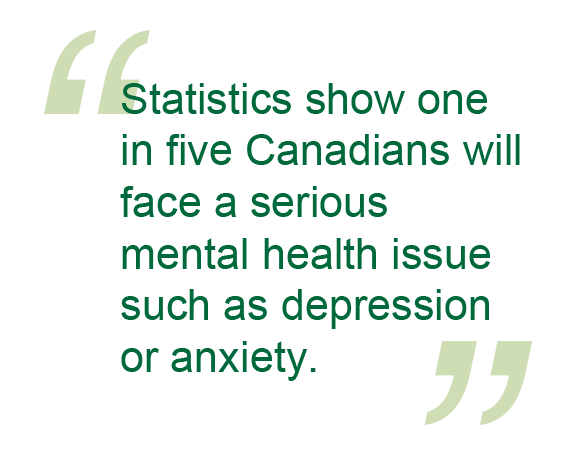Understanding mental health
"How do you feel?"
"I'm fine."
Does this sound familiar? Is it just another bad day with a little stress at work or is there more going on?
Assessing mental health is not as simple as taking a blood test. Awareness, understanding and knowledge of mental health issues may help move towards achieving health and cultivating a sense of emotional wellbeing. Preserving a healthy balance is important to the maintenance of ongoing mental health, with or without a diagnosis.
 Statistics show one in five Canadians will face a serious mental health issue such as depression or anxiety1. Most mental illnesses can be treated and have a high rate of recovery among those who access the appropriate care2. The road to feeling well and living a fulfilling life may start with acknowledging that sometimes help is needed. It’s important to identify that moment and take action.
Statistics show one in five Canadians will face a serious mental health issue such as depression or anxiety1. Most mental illnesses can be treated and have a high rate of recovery among those who access the appropriate care2. The road to feeling well and living a fulfilling life may start with acknowledging that sometimes help is needed. It’s important to identify that moment and take action.
If you (or someone you know) are not feeling like yourself, or if you feel you are losing the ability to enjoy and cope with life, check out the information below. There may be areas where you can put things in better balance or it may help you identify if talking to your doctor or a mental health professional would be worthwhile.
-
Conditions - This series created by Manulife’s mental health specialists and Homewood HealthTM provides information about symptoms and treatments for different mental health conditions.
Check Up From the Neck Up - This simple, private mental health check-up from the Mood Disorder Association of Ontario can help identify some symptoms of depression, anxiety or bipolar disorder. You can also learn more about mood disorders and find resources to help yourself, your family members, or friends.
Mental Health Meter - This questionnaire from the Canadian Mental Health Association can help you reflect on your unique strengths and identify areas where your level of mental fitness could be improved to help you cope with life’s up and downs.
Questionnaire Mental health : Separating myth from reality - This online quiz will help you determine how much you know about mental health. You'll also find information on understanding and preventing mental illness, as well as links to stories about recovery.
Health risk assessment (HRA) - Your employer may offer an online tool that can help you identify if you are at risk for stress or depression. Depending on your readiness to change your behaviour (pre-contemplation, contemplation, preparation, maintenance/action, relapse), the tool can provide you with tips and resources for improving your health. Contact your HR benefits consultant, manager, or union representative to find out if your benefit plan offers HRA services.
- 1Canadian Mental Health Association (www.cmha.ca, retrieved 2014)
- 2Steinert, C., Hofmann, M., Kruse, J., & Leichsenring, F. (2014). The prospective long-term course of adult depression in general practice and the community. A systematic literature review. Journal Of Affective Disorders,152-15465-75. doi:10.1016/j.jad.2013.10.017





